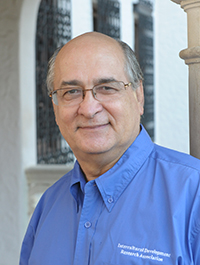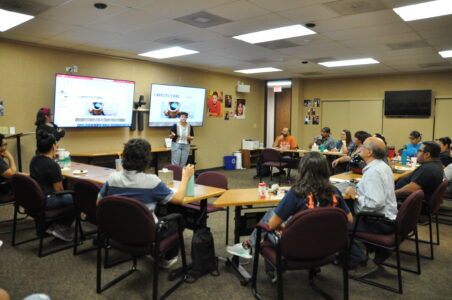• By Aurelio M. Montemayor, M.Ed. • IDRA Newsletter • September 2023 • 
When students in Houston and San Antonio faced the disheartening cancellation of an ethnic studies class and the reassignment of a cherished teacher, they took action, remarkable action.
The students’ efforts are a testament to their determination that these valuable education resources not be lost. In both cases, the students pushed for an education that is connected to their cultural heritage.
Students Secure Mexican American Studies Course
In San Antonio, IDRA has been cosponsoring a series of cafecitos, or coffee hours, for an informal Mexican American Studies (MAS) community of practice, a gathering where teachers and students with a shared interest in MAS converge. Community members are drawn to this initiative as well to offer their support to these crucial classes.

Students in a September Cafecito y Mas describe their youth participatory action research project MAS for All, supported by IDRA, to investigate the status of MAS their school district.
Other cafecito cosponsors with IDRA include the MAS Teacher Academy, MASISTA (Mexican American Studies Independent Students Taking Action), and the Race, Ethnicity Gender and Sexuality Studies department at the University of Texas at San Antonio.
On a Saturday morning earlier this year, students facilitated the gathering. The master of ceremonies was a high school senior, and the panel consisted of five students from different high schools in the area.
Some students participating for the first time became intrigued by the discussions. Among them was a high school junior and her aunt. The student approached a senior classmate and asked, “Why don’t we have a Mexican American Studies class at our school?”
Back at school, the two students explored further, leading to the discovery that the class had been canceled due to a perceived lack of interest among students and a lack of enthusiasm from faculty members.
Undeterred, the students created a survey to gauge student interest in MAS. The student researchers interviewed over 100 students, a significant portion of the student body.
Astonishingly, the vast majority expressed their desire for MAS classes to be reinstated. The survey results were illuminating: 35 students wanted to enroll in the class if it was offered the following year.
When the students shared their results, school officials listened and placed the class on the schedule for the next year. And student engagement continues to grow.
Students Secure Mariachi Class
In Houston, a different but equally impactful student-led initiative took shape. A high school had once offered a mariachi class – a celebration of Mexican cultural musical traditions. Unfortunately, this class was discontinued due to budget constraints, the departure of the teacher and a decline in student enrollment.
A group of students, including a young lady who had never played a musical instrument before, felt the loss. During her sophomore year, one determined student began to rally her peers, and as a junior, she emerged as a leader. She and other students organized after-school mariachi rehearsals, teaching themselves the music since there was no available teacher.
Parents joined the cause and, with IDRA’s support, the advocates held virtual meetings to plan and mobilize. The students initiated a survey and created posters to raise awareness. Their mariachi group, named “Mariachi de Los Altos” (Spanish for “The Heights”), held performances, attracting more members to their ranks. This diverse group of students, primarily of Mexican American heritage, included a Black lead singer.
By the end of the academic year, their persistence paid off. The school principal announced that she would hire a teacher and reinstate the mariachi class. This fall, the dream became a reality as the school reintroduced the class with a dedicated teacher.
Student-Led Advocacy Stresses the Importance of Ethnic and Cultural Education
These two examples of student leadership are extraordinary for several reasons. First, they were entirely student-driven initiatives, devoid of any external adult pressure or structure. And they highlight the intelligence and assertiveness of students.
Second, it is genuinely unique to witness students advocating passionately for the preservation and reinstatement of specific classes, to the extent of conducting surveys, providing data and leading their peers in support.
Moreover, these initiatives highlight the significance of ethnic and cultural education. Both projects involved strong ethnic and cultural themes. And the impact extended beyond students of a particular background. It was a broader issue to them. Students were keen to learn about the histories and contributions of various cultural groups that shape the United States.
The student actions reinforce an IDRA long-term commitment to support student initiative and leadership especially those led by students whom others may not consider capable of leadership. When organized and empowered, students can effect positive change in their educational environments.
Furthermore, these stories shed light on a growing concern among students: limits on discussions of race and culture in school and book ban expansions. Many students are deeply troubled by these developments and are advocating for the expansion, not reduction, of ethnic studies programs.
These shining examples demonstrate that young individuals are capable of not only identifying gaps in their education but also taking proactive steps to bridge those gaps. The student-led initiatives in Houston and San Antonio remind us that education is not just the responsibility of teachers and administrators; it is a collective effort in which students play a crucial role in shaping their own learning experiences and advocating meaningful change. Students value and seek to learn cultural traditions and ethnic histories.
Aurelio M. Montemayor, M.Ed., is IDRA’s family engagement coordinator and directs IDRA Education CAFE work. Comments and questions may be directed to him via email at aurelio.montemayor@idra.org.
[©2023, IDRA. This article originally appeared in the September 2023 edition of the IDRA Newsletter by the Intercultural Development Research Association. Permission to reproduce this article is granted provided the article is reprinted in its entirety and proper credit is given to IDRA and the author.]


